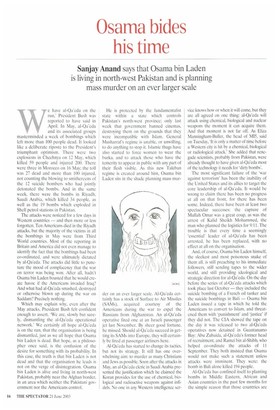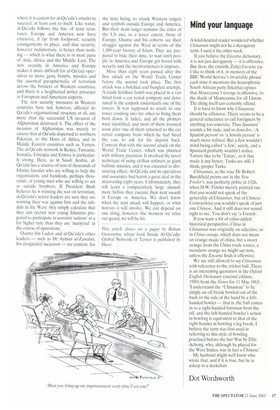Osama bides his time
Sanjay Anand says that Osama bin Laden is living in north-west Pakistan and is planning mass murder on an ever larger scale
Nve have al-Qa'eda on the run, President Bush was reported to have said in April. In May, al-Qa'eda and its associated groups masterminded a week of bombings which left more than 100 people dead. It looked like a deliberate riposte to the President's triumphant optimism. There were two explosions in Chechnya on 12 May, which killed 59 people and injured 200. There were three in Morocco on 16 May; the toll was 27 dead and more than 100 injured, not counting the blowing to smithereens of the 12 suicide bombers who had jointly detonated the bombs. And in the same week, there were the bombs in Riyadh, Saudi Arabia, which killed 34 people, as well as the 19 bombs which exploded in Shell petrol stations in Pakistan.
The attacks were noticed for a few days in Western countries — and then more or less forgotten. Ten Americans died in the Riyadh attacks, but the majority of the victims in all the bombings in May were from Third World countries, Most of the reporting in Britain and America did not even manage to identify the fact that the bombings had been co-ordinated, and were ultimately dictated by al-Qa'eda. The attacks did little to puncture the mood of complacency that the war on terror was being won. After all hadn't Osama bin Laden boasted that he would create havoc if the Americans invaded Iraq? And what had al-Qa'eda smashed, destroyed or otherwise blown up during the war on Saddam? Precisely nothing.
Which may explain why, even after the May attacks, President Bush felt confident enough to assert, We are, slowly but surely, dismantling the al-Qa'eda operational network.' We certainly all hope al-Qa'eda is on the run, that the organisation is being dismantled, just as we all hope that °Kuria bin Laden is dead. But hope, as a philosopher once said, is the confusion of the desire for something with its probability. In this case, the truth is that bin Laden is not dead and that the organisation he leads is not on the verge of disintegration. Osama bin Laden is alive and living in north-west Pakistan, probably near the Afghan border, in an area which neither the Pakistani government nor the Americans control.
He is protected by the fundamentalist state within a state which controls Pakistan's north-west province; only last week that government banned cinemas, destroying them on the grounds that they were incompatible with Islam. General Musharraf s regime is unable, or unwilling, to do anything to stop it. Islamic thugs have also started to force women to wear the burka. and to attack those who have the temerity to appear in public with any part of their flesh visible. As this new Taleban regime is created around him, Osama bin Laden sits in the shade planning mass mur
der on an ever larger scale. Al-Qa'eda certainly has a stock of Surface to Air Missiles (SAMs), acquired courtesy of the Americans during the war to expel the Russians from Afghanistan. An al-Qa'eda operative fired one at an Israeli passenger jet last November. By sheer good fortune, he missed. Should al-Qa'eda succeed in getting its SAMs into Europe, they will certainly be fired at passenger airliners here.
Al-Qa'eda has started to change its tactics, but not its strategy. It still has one overwhelming aim: to murder as many Christians and Jews as possible. Soon after the attacks in May, an al-Qa'eda cleric in Saudi Arabia presented the justification which he claimed the Koran provides for the use of chemical, biological and radioactive weapons against infidels. No one in any Western intelligence ser
vice knows how or when it will come, but they are all agreed on one thing: al-Qa'eda will attack using chemical, biological and nuclear weapons the moment it can acquire them. And that moment is not far off. As Eliza Manningham-Buller, the head of MI5, said on Tuesday, 'It is only a matter of time before a Western city is hit by a chemical, biological or radiological attack.' She added that renegade scientists, probably from Pakistan, were already thought to have given al-Qa'eda most of the technology it needs for 'dirty bombs'.
The most significant failure of the 'war against terrorism' has been the inability of the United States and its allies to target the core leadership of al-Qa'eda. It would be wrong to claim there has been no progress at all on that front, for there has been some. Indeed, there have been at least two spectacular successes: the capture of Mullah Omar was a great coup, as was the arrest of Kalid Sheikh Mohammed, the man who planned the logistics for 9/11, The trouble is that every time a seemingly 'essential' leader of al-Qa'eda has been arrested, he has been replaced, with no effect at all on the organisation.
And, of course. Osama bin Laden himself, the sleekest and most poisonous snake of them all, is still preaching to his immediate followers, still sending tapes to the wider world, and still providing ideological and strategic direction for al-Qa'eda. On the day before the series of al-Qa'eda attacks which took place last October — they included the suicide bombing of a French oil tanker and the suicide bombings in Bali — Osama bin Laden issued a tape in which he told the Americans to convert to Islam, and threatened them with 'punishment' and 'justice' if they did not. The CIA showed the tape on the day it was released to two al-Qa'eda operatives now detained in Guantanamo Bay: Abu Zubaida, al-Qa'eda's former head of recruitment, and Ramzi bin al-Shibh, who helped co-ordinate the attacks of 11 September. They both insisted that Osama would not make such a statement unless attacks were imminent. They were: the bomb in Bali alone killed 194 people.
Al-Qa'eda has confined itself to planting bombs in Middle Eastern, African and Asian countries in the past few months for the simple reason that those countries are where it is easiest for al-Qa'eda's attacks to succeed, at least cost to itself. Like water, al-Qa'eda follows the line of least resistance. Europe and America now have extensive, if far from foolproof, security arrangements in place: and that security, however rudimentary, is better than nothing — which is what there is in most parts of Asia, Africa and the Middle East. The new security in America and Europe makes it more difficult for al-Qa'eda operatives to move guns, bombs, missiles and the assorted paraphernalia of terrorism across the borders of Western countries, and there is a heightened police presence in European and American airports.
The new security measures in Western countries have not, however, affected alQa'eda's organisational structure at all, any more than the successful US invasion of Afghanistan destroyed it. The effect of the invasion of Afghanistan was merely to ensure that al-Qa'eda dispersed to northern Pakistan, to the Horn of Africa, and to Middle Eastern countries such as Yemen. The al-Qa'eda network in Kenya, Tanzania, Somalia, Ethiopia and Eritrea is particularly strong. Here, as in Saudi Arabia, alQa'eda has a reserve of tens of thousands of Islamic fanatics who are willing to help the organisation, and hundreds, perhaps thousands, of young men who are willing to act as suicide bombers. If President Bush believes he is winning the war on terrorism, al-Qa'eda's senior leaders are sure they are winning their war against him and the infidels in the West: they simply calculate that they can recruit new young Islamists prepared to participate in terrorist 'actions' at a far higher rate than they are 'martyred' in the course of operations.
Osama bin Laden and al-Qa'eda's other leaders — such as Dr Ayman al-Zawahri, his designated successor — are content, for the time being, to attack Western targets and symbols outside Europe and America. But their main target remains the cities of the US and, to a lesser extent, those of Europe. Osama and his cohorts see their struggle against the West in terms of the I,400-year history of Islam. They are prepared to bide their time, to wait until people in America and Europe get bored with security and the inconveniences it imposes.
More than eight years passed after the first attack on the World Trade Center before the second took place. The first attack was a botched and bungled attempt. A crude fertiliser bomb was placed in a van hired from a car rental company and detonated in the carpark underneath one of the towers. It was supposed to result in one tower crashing into the other to bring them both down. It failed, and all the plotters were identified, and most of them arrested soon after one of them returned to the car rental company from which he had hired the van, to ask for his deposit back. Contrast that with the second attack on the World Trade Center, which was planned with military precision. It involved the novel technique of using civilian airliners as giant ballistic missiles, and it was executed to devastating effect. Al-Qa'eda and its operatives and associates had learnt a great deal in the intervening eight years. Unfortunately, they will learn a comparatively large amount more before they execute their next assault in Europe or America. We don't know when the next attack will happen, or what horrors it will involve. We can depend on one thing, however: the moment we relax our guard, we will be hit.
This article draws on a paper by Rohan Gunaratna, whose book Inside Al-Qa'eda: Global Network of Terror is published by Hurst.



































































































 Previous page
Previous page